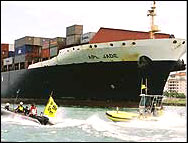As the second anniversary of the Sept. 11 terrorist attacks looms, the Bush administration is facing opprobrium for having deceived the American public about possible air-quality concerns at Ground Zero. Behind the scenes, the issue has become somewhat bizarrely entwined with another hot topic: the confirmation of Republican Gov. Michael Leavitt of Utah as the new U.S. EPA administrator. What’s the connection? Nada. But Leavitt’s confirmation hearing can be delayed by filibuster, which means it offers environmentally minded senators a megaphone to address the Ground Zero quandary and other green grievances.

What does this man have to
do with Ground Zero?
For those of you who missed the background on the Ground Zero air issue, here’s the wrap: In late August, the EPA’s inspector general released a report saying that deadly contaminants in the World Trade Center wreckage — including asbestos, lead, and glass fibers — posed potential health hazards that were not addressed in reassuring EPA press releases following the attacks. During a Labor Day parade in Manhattan last Saturday, Sen. Hillary Clinton (D-N.Y.) vowed that if the Bush administration did not explain the omissions, she would block Leavitt’s nomination during Senate hearings that are scheduled to begin as early as next week.
“The problem here isn’t Leavitt,” says Jennifer Hanley, a spokesperson at Clinton’s New York City office. “Sen. Clinton’s [decision] was the only way she could get [the administration’s] attention and address her concerns about the health of New York City. It was a last resort.” In response to the inspector general’s report, Sens. Clinton and Joseph Lieberman (D-Conn.) went to the White House and requested information about who fudged the Ground Zero air-quality reports and why. Then they went to the chair of the Committee on Environment and Public Works and requested hearings on the issue. “Neither request went anywhere,” said Hanley. So Clinton threatened a filibuster.
The strategy is probably a smart one — long delays in the Leavitt nomination would be a major nuisance for the White House — and it seemed to produce results, since this past weekend acting EPA Administrator Marianne Horinko ponied up answers. Trouble is, say Lieberman and Clinton, the answers were bogus. Horinko’s letter essentially reiterated her initial rebuttal to the inspector general’s report, saying there was no cover-up and that the EPA had good intentions. Yesterday, the senators wrote a letter to President Bush excoriating Horinko’s shoddy response and her “deceptive and selective excerpting of the inspector general’s report,” and demanding that their questions be answered by a more qualified official.
Unfortunately for Bush, this is just a trickle in a potential torrent of concerns that could be unleashed in the coming weeks about the administration’s environmental record. “We have a long list of outstanding requests for information that go all the way back to May 2001,” says Chris Miller, a staff member of the Environment and Public Works Committee who serves under Sen. Jim Jeffords (I-Vt.), the committee’s ranking member. “Sen. Jeffords hasn’t decided whether he will hold [the Leavitt nomination] based on this missing information, but it has certainly crossed our mind. We want answers, and we’re waiting to see what kind of information we get.”
Meanwhile, Lieberman has announced that he “strongly support[s]” Clinton’s threat of a filibuster. And his staffers say the junior senator from Connecticut might also move to block a Leavitt nomination until the nominee clarifies his positions on issues ranging from New Source Review to global warming to toxic-waste cleanup, as well as provides details about his environmental record as governor. “There certainly could be other issues that come up that would provoke Sen. Lieberman or other senators to put a hold on the Leavitt nomination until they find out more information,” said Casey Aden-Wansbury, a Lieberman spokesperson.
On Sept. 9, 14 environmental organizations endorsed a letter that was sent to all 100 senators encouraging them to carefully scrutinize Leavitt’s record. As with Clinton’s threatened filibuster, however, the letter had little to do with Leavitt himself. “If the vote were held today, my guess is that Leavitt would be confirmed,” says Kevin Curtis, vice president of the D.C.-based National Environmental Trust, one of the participating organizations. “Few senators have major objections to Leavitt’s record, but many object to the larger issue of Bush’s assault on the environment. We are trying to convince them to turn the vote on Leavitt into a referendum on Bush’s environmental policies.” The idea, he says, is to convince the 40-plus Senators who consistently vote against Bush’s environmental policies to vote against Leavitt “as the new face on their anti-environment agenda. This is a rare opportunity for them to send a signal to Bush, Leavitt, and the public that it’s time to make a change.”
Declaring War Against Greenpeace?

Greenpeace activists approach a
cargo ship in Miami.
Photo: Greenpeace.
“A major threat coming not just at our organization, but at the right to engage in nonviolent direct action” — that’s how John Passacantando, executive director of Greenpeace USA, characterizes an unprecedented indictment of Greenpeace by the federal government. The indictment came in response to a protest that took place in April 2002, and, true to Greenpeace style, went well beyond cardboard signs and face paint. Fourteen Greenpeace activists and one freelance photographer were accused of trying to sneak two people onto a cargo ship believed to contain contraband mahogany arriving from Brazil to the port of Miami (where security has been considerably beefed up since the terrorist attacks two years ago). Though Brazil outlawed mahogany exports in 2001, Greenpeace believes 80 percent of all timber from the Amazon is illegally logged.
The charges against the protesters were eventually dropped or settled, but this July, more than a year after the incident, a grand jury charged the organization with two federal misdemeanors — for boarding a ship before arrival and for conspiracy to do so. Each charge can result in a $10,000 fine and five years of probation. Greenpeace is no stranger to run-ins with the law, but “this is certainly the first time the organization at large has been indicted by the federal government,” says Greenpeace attorney Tom Wetterer. (Past charges have been leveled by state and local law enforcement, or against individual protestors.)
“This is overkill. It’s along the lines of the Patriot Act,” says Wetterer. “The Bush administration is trying to crack down on all types of political protest by using terrorism as an excuse.” If the feds had gone after the NAACP for every civil-rights protest of the 1950s and ’60s, asks Wetterer, what would have happened to the civil rights movement? “If they go against the organization rather than the protestors, it can only have a chilling effect on the first amendment and the environmental movement at large.” A hearing on the matter is set for Oct. 14. The U.S. Attorney’s office in Miami was not available for comment.
The Missing Links
We like to think we’re unique here at Grist, but we’re more than happy to acknowledge that we’re not the only lantern-bearer plunging into the murky caverns of the Bush administration’s environmental policy. So we figured we’d help environmentalists stay in the know by assembling a list of watchdog resources put out by various green organizations. We welcome your additions.
- Natural Resources Defense Council‘s “Bush record” webpage has a vast archive of rollbacks.
- National Environmental Trust assembles environmental editorials from U.S. newspapers.
- The League of Conservation Voters has a useful collection of budget data, memos, and a summary of rollbacks.
- The Sierra Club keeps tabs on Bush’s environmental activities in “W. Watch.”
- The Wilderness Society chronicles the Bush administration’s record on public lands.
- Earthjustice keeps track of White House nominations and campaign contributions in the “Paybacks” section of its website.
- Mother Jones published an overview of the Bush record in its September issue.

